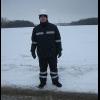|
|

Propane Compressor Discharge Pressure - Effect On Compressor Power
#1

Posted 04 July 2016 - 08:19 AM
#2

Posted 05 July 2016 - 02:33 AM
Discharge pressure is related to condensing temperature of the vapors from the compressor.
If one vendor uses an aircooled condensor to condense compressed vapors, while the other vendor uses cooling water, there will be a difference in required compressor discharge pressure for the same medium.
It could also be that vendors use different refrigerant mediums, so different condensation pressures required.
Power difference is also affected by compressor type: centrifugal versus recip versus screw.
Edited by PingPong, 05 July 2016 - 02:41 AM.
#3

Posted 05 July 2016 - 06:15 AM
Hello and thank for reply.
I should add that both Vendors use Air cooler, propane refrigerant and Screw type of compressor
Regards,
Dmytro
#4

Posted 05 July 2016 - 06:59 AM
There is a 10 oC difference in condensing temperature of propane at 20 or at 16 bar.
So if both vendors use the same air temperature, then one vendor apparently supplies a smaller condenser requiring a higher condensing temperature (and pressure).
That is assuming both compressors have the same propane flowrate to be condensed.
From another point of view we have bigger delta P in expansion valve which give more cooling of liquid propane upstream chiller.No. Propane temperature upstream chiller depends only on chiller pressure, and will be the same in both cases, assuming both chillers work at same pressure.
A higher condensing temperature (warmer condensate), due to higher pressure, will produce more vapor upstream the chiller, requiring the compressor to process more flash vapor on top of the vapor produced by the chiller duty.
Outsiders would need to see both vendor proposals to understand what is really the difference here. Now it is not even clear to me what the scope of supply of the vendors is.
However you must not post those proposals here as that would be a violation of confidentiality and could get you into trouble.
To evaluate vendor proposals one normally makes a detailed table comparing all requirements and specifications of the requisition with the data of all vendors. By comparing all columns in that table it becomes clear whether all vendors meet all specifications, and if so, what exactly is the difference between the vendors. Discuss the table with your more experienced colleagues, and contact vendors to answer any questions you come up with, before deciding which vendor to select.
#5

Posted 05 July 2016 - 02:03 PM
There is a 10 oC difference in condensing temperature of propane at 20 or at 16 bar.
So if both vendors use the same air temperature, then one vendor apparently supplies a smaller condenser requiring a higher condensing temperature (and pressure).
That is assuming both compressors have the same propane flowrate to be condensed.
From another point of view we have bigger delta P in expansion valve which give more cooling of liquid propane upstream chiller.No. Propane temperature upstream chiller depends only on chiller pressure, and will be the same in both cases, assuming both chillers work at same pressure.A higher condensing temperature (warmer condensate), due to higher pressure, will produce more vapor upstream the chiller, requiring the compressor to process more flash vapor on top of the vapor produced by the chiller duty.
Outsiders would need to see both vendor proposals to understand what is really the difference here. Now it is not even clear to me what the scope of supply of the vendors is.
However you must not post those proposals here as that would be a violation of confidentiality and could get you into trouble.
To evaluate vendor proposals one normally makes a detailed table comparing all requirements and specifications of the requisition with the data of all vendors. By comparing all columns in that table it becomes clear whether all vendors meet all specifications, and if so, what exactly is the difference between the vendors. Discuss the table with your more experienced colleagues, and contact vendors to answer any questions you come up with, before deciding which vendor to select.
Thanks,
I used Hysys to check required compressor power at different parameters according to Vender data:
1. Required compressor power is 544 kW at discharge Pressure 20 bar and temperature 100 deg C. Note that 54 deg C is condenser temperature according to Vendor data. Selected compressor power is 600 kW
2. Required compressor power is 430 kW at discharge Pressure 16 bar and temperature 87 deg C. Note that 43 deg C is condenser temperature according to Vendor data. Selected compressor power is 600 kW
So difference is condenser temperature and comprresor P and T, which gives another results in compressor power.
I am wonder why 1 st Vendor use higher condenser temperature than 2 nd and discharge pressure. And this is reason of higher compressor power?
#6

Posted 06 July 2016 - 03:34 AM
Yes, higher condensation temperature, and consequently higher condensation pressure, increases compressor power.
Question why different vendors use different condensation temperatures can only be answered by vendors.
What maximum ambient air temperature did you specify in the requisition that was sent to both vendors?
#7

Posted 06 July 2016 - 03:42 AM
Yes, higher condensation temperature, and consequently higher condensation pressure, increases compressor power.
Question why different vendors use different condensation temperatures can only be answered by vendors.
What maximum ambient air temperature did you specify in the requisition that was sent to both vendors?
Hello, maximum ambient air temperature was +45 deg. C.
#8

Posted 06 July 2016 - 06:18 AM
With 45 oC air one cannot condense propane at 43 oC & 16 bar.
Condensing propane at 54 oC & 20 bar with 45 oC air is in theory possible, but in practice very difficult.
You should check what ambient air temperature the vendors quote in their proposals.
#9

Posted 12 July 2016 - 07:40 AM
Thanks!
#10

Posted 30 July 2016 - 08:16 AM
Hi'
Technically, both proposals are acceptable. You must study the total cost and operating cost for selecting the more economical proposal.
The 1st vendor using higher temperature this gives smaller condenser size but at the expense of higher motor power and hence operating cost.
The 2nd vendor using lower condensing temperature that gives bigger condenser size but smaller motor power.
I hope you understand my comments. The bottom line is what is the total cost and the NPV i.e. Net Present Value.
Good luck
S.Ahmad
Edited by S.AHMAD, 30 July 2016 - 08:19 AM.
#11

Posted 31 July 2016 - 01:58 AM
my 2 cents....
- post #10 is right but only if the condition of post #8 is verified (of course)... anyway it is very hard to think that both vendors have missed this fundamental.... moreover at least 2°C of design margin should be applied.
- about calculations reported in post #4, they are not so simple for screw compressors... especially if they are "wet" type (the most commonly used)
good luck!
#12

Posted 02 August 2016 - 04:37 AM
I am late but this topic seems interesting. Normally the discharge pressure of the compressor is set during the process engineering stage/in the process design package. I don't understand why two vendor is considering two different discharge pressure as their battery limit is only the compressor; not rest of the plant like chiller/economizer/propane condenser etc. On what basis did they propose their product? It would be nice if the OP clarifies. Thanks everyone for this nice discussion.
Similar Topics
Compressor Selection Based On Flowrate & Compression RatioStarted by Guest_Dhams_* , 19 Jan 2026 |
|

|
||
Lowering Energy Consumption Of A Gas CompressorStarted by Guest_zbrna_* , 22 Dec 2025 |
|

|
||
Steam Pots Cyclic Pressure Pulsation And Water HammeringStarted by Guest_Abdelilah_* , 07 Dec 2025 |
|

|
||
Flow & Pressure Regulation For Compressible FluidsStarted by Guest_Abdessamed1961_* , 14 Dec 2025 |
|

|
||
Help Needed –Valve Causing High Pressure In Downstream VesselStarted by Guest_Alaa55_* , 27 Nov 2025 |
|

|

 FB
FB









